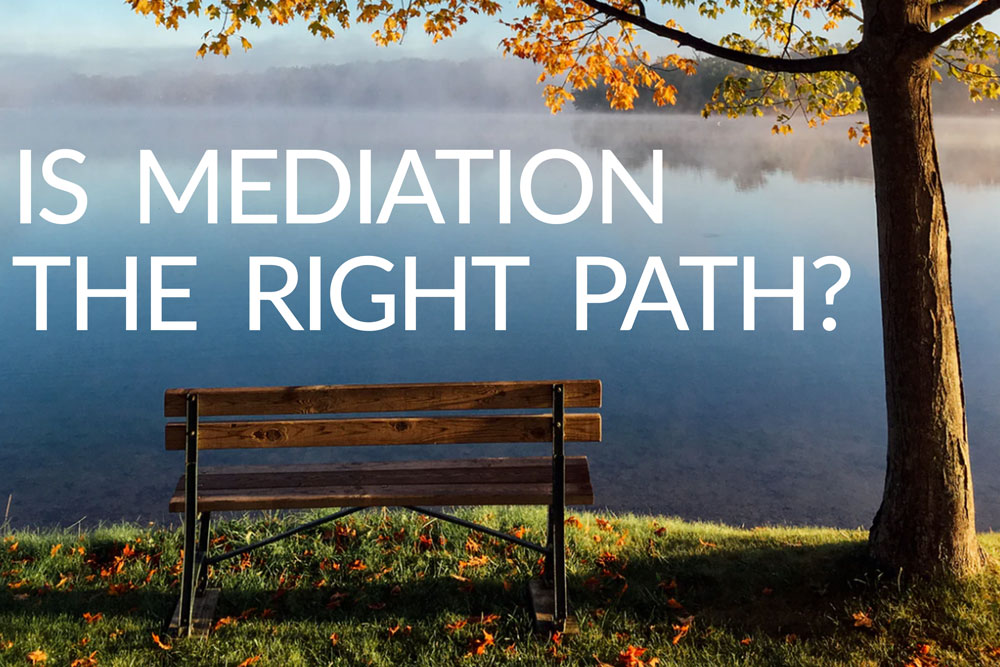Separation or divorce bring about financial, emotional and physical changes for the couple divorcing, and for their families. How to divide assets, how to arrange future finances, where will the children live, and how should the children be parented and nurtured are just a few of the critical issues which need to be addressed. As a result, stress and conflict inevitably will occur. But, the way in which these conflicts are approached and resolved can greatly influence how easily the couple and the family adjusts to the new reality.
This is where mediation can be extremely valuable. Conflict need not be crippling, nor generate long-term animosity if it’s handled in the right way. Mediation is a way for members of a family to resolve conflicts in the midst of, or after, a separation or divorce. At a time when emotions of fear, anger, or hurt may be running high, it is possible to rationally come to an understanding where the interests of all individuals involved are valued and balanced.
Mediators meet the divorcing couple in the middle and stand as a neutral professional. By clearly defining the causes behind the conflict and keeping the lines of communication open, they promote rational conversation and look for agreeable resolutions. They work with the couple, and with the children when they are old enough for that to be appropriate, to find the best possible solution. However, in order for mediation to work well, all participants must be willing to put in an earnest effort towards finding a solution. Will mediation work for your family? Below are some common questions and answers to help you decide if this is the best option for your family.
What does mediation entail?
The role of the mediator is to help people in conflict reach a solution to their problem by finding an outcome that all parties accept. During the process of mediation, the mediator acts as a neutral member by avoiding taking sides, making judgments, or giving guidance. Their role is to keep the lines of communication open by allowing all parties a chance to be heard, thus reducing hostile competitive feelings. Mediators may suggest solutions, however, any and all agreements are made by the members of the family.
What types of disputes are best resolved through mediation?
Mediation is often helpful for couples experiencing conflict during and after a separation or divorce. Mediators can be especially beneficial in the area of parenting by helping mom and dad to understand the needs of the children involved and to determine what is in their best interest. Mediation is also useful when trying to reach an agreement about the division of property and the allocation of future earnings. A dispassionate perspective as well as a deep experiential base gives the mediator the tools which most divorcing couples don’t have. Most people who divorce haven’t done it before and don’t have any experience or expectation on which to rely. A good mediator has years of experience handling dozen of cases and brings all that knowledge to the table.
Do both parties have to participate?
Yes. In order for mediation to be a successful process, both parties must realize this is a joint, cooperative problem-solving process and be willing to participate. Participants must be willing to work together to find a solution that best fits their interests, their spouse’s interests, and of course the interests of any children who are involved.
Will mediation help us get back together?
While feelings about the marriage and separation or divorce may be discussed, mediation is not couples counseling. The primary focus of mediation is to find solutions that will assist the family members in adjusting to the separation or divorce and to be able to work together to confront future issues as a family. Any doubts about the separation or divorce should be discussed separate from the mediation, perhaps with a counselor.
Are children involved in the mediation process?
Children may participate depending on the topic of discussion, the wishes of their parents, their own wish to participate and their age or maturity level. It can be comforting for children to see their parents having a constructive conversation that allows them to work together instead of fighting or competing. It also may be beneficial for parents to involve teenage children in order to better understand their needs and feelings.
Do I need an attorney?
Mediation is not a substitute for legal advice and each participant should be given a chance for his or her agreement to be reviewed by an attorney of their choosing. While the mediator assists participants in reaching their own agreements from a neutral standpoint, lawyers help their clients make informed agreements, understand the law, and complete the legal aspects of the divorce or separation.
Are mediation agreements legally binding?
Mediation agreements can either take the form of an informal working agreement or can be filed as a legal contract. An agreement made through mediation becomes legally binding when it is incorporated into a court order or divorce decree. If an agreement previously approved by a judge is to change, it must be filed with the court in order for the change to be legally binding.
What if we cannot come to an agreement?
Mediation may not solve all conflicts between parties; however, even small agreements can be beneficial in the long run. Mediation can help direct the conversation and narrow down the issues which may require an attorney to solve. Accordingly, even if mediation does not solve all conflicts, it can reduce the time and legal expenses.
How much does it cost?
Mediation services through a court are typically provided for a small user fee. Private mediation practices charge an hourly fee which can be split between the parties. Again, even a private mediator will typically cost less than litigation.
Where can I find a mediator?
Professional mediators in your community can be found through your local bar association, in the telephone directory yellow pages, or through a referral from a family lawyer. Court-connected services can also be utilized for advisement on the various types of mediation services available to the community.
When is mediation not a good idea?
As stated earlier, mediation is most helpful when both parties are willing to work together and psychologically capable of following through with the agreements they reach. When there are concerns of abuse, domestic violence, drug or alcohol addictions, or mental illnesses, mediation may not be the best choice. Additionally, if the pain, hurt and anger are so deep that one or both parties cannot commit to dealing rationally with the process and with one another, mediation will be of little value.
Concluding Thoughts
Conflict during a separation or divorce is normal; very few, if any divorces are totally dispassionate. There is almost always an emotional component, and there is always a difference of opinion, otherwise there wouldn’t be a divorce. With differences and emotions come conflict. But conflicts do not need to inflict greater pain, and they can be resolved peacefully. If a couple who is separating or divorcing can commit to working things out so that everyone’s interests can be voiced, addressed, and met to the greatest possible degree, then mediation becomes a very powerful tool. In such situations, the benefits can be enormous, both during the separation or divorce period, as well as into the long-term future. This is never more true than when children are involved. A couple may cease being husband and wife, but they will never cease being mom and dad. So, if at all possible, mediate before you litigate.


